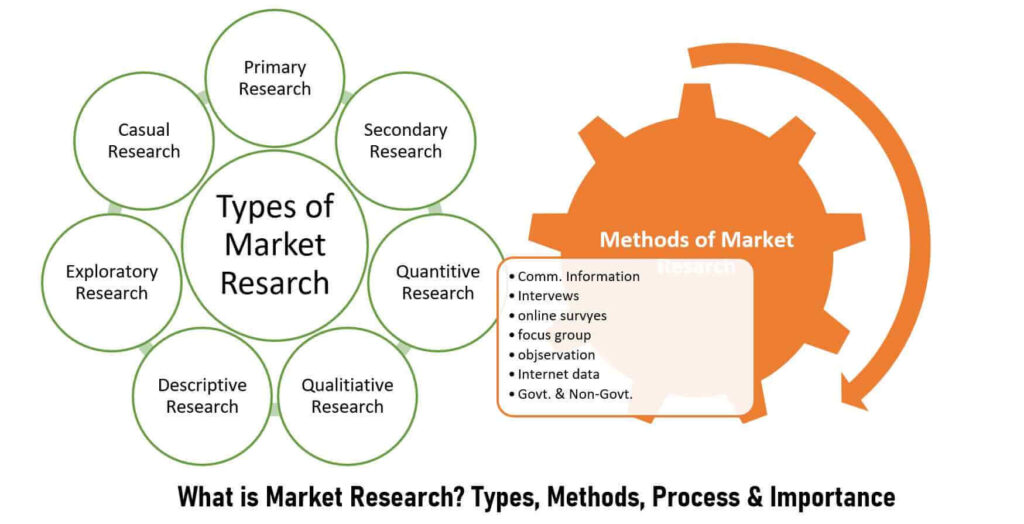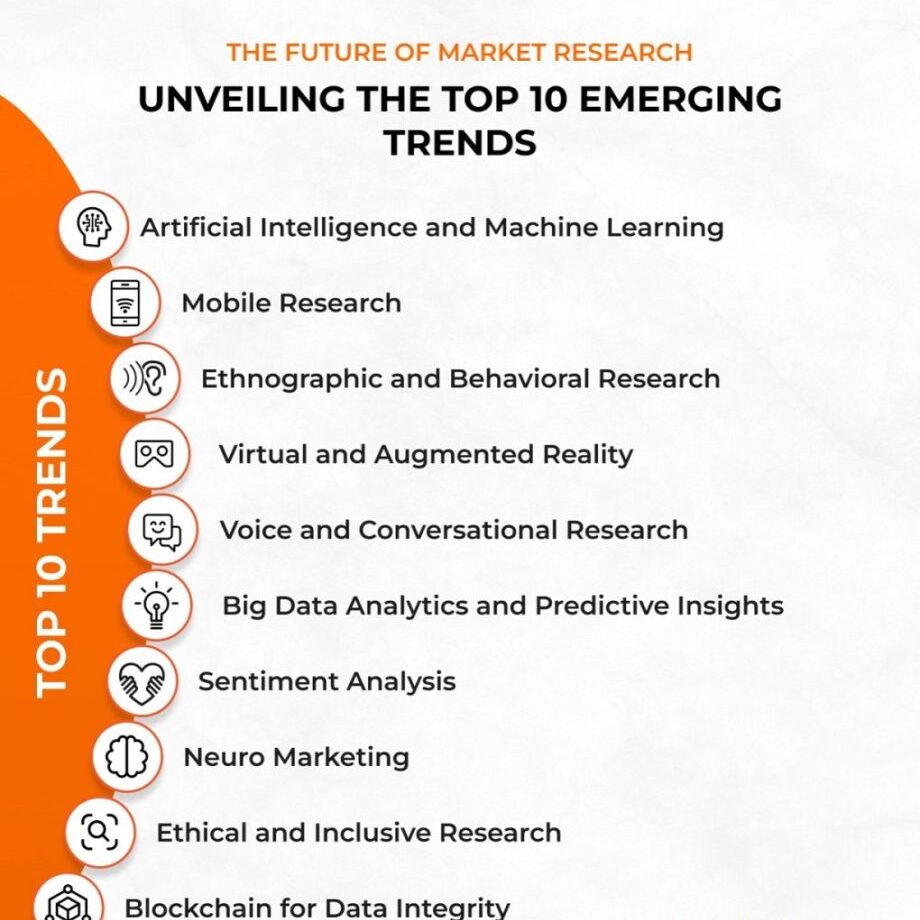
In today’s fast-paced and ever-evolving business landscape, staying competitive and making informed decisions is paramount. This is where market research steps in as an invaluable tool for organizations of all sizes and industries. It serves as a compass guiding businesses through the maze of consumer preferences, industry trends, and competitive landscapes. In this comprehensive guide, we’ll delve into the essence of market research, explore its various types, analyze emerging trends, and uncover the technological advancements that have revolutionized the field. Furthermore, we’ll highlight real-world use cases that demonstrate how market research can be a game-changer for your business.
Understanding Market Research:
Market research is a systematic process aimed at gathering, analyzing, and interpreting data relevant to a specific market, industry, or product. It is the bedrock upon which businesses build their strategies, enabling them to make informed decisions that can significantly impact their success.
Types of Market Research:

- Primary Research: This involves the collection of original data directly from the source. It can take the form of surveys, interviews, focus groups, or observations. Primary research provides firsthand insights into consumer behaviors, preferences, and opinions.
- Secondary Research: Secondary research relies on existing data sources such as industry reports, academic studies, and publicly available information. It serves as a foundation for understanding market trends, competition, and historical data.
- Qualitative Research: Qualitative research delves deep into the why and how of consumer choices. It seeks to understand motivations, emotions, and perceptions through methods like open-ended surveys and in-depth interviews.
- Quantitative Research: This type of research focuses on numerical data and statistics. Surveys with structured questions and data analysis techniques like regression analysis are used to uncover trends and correlations.
- Exploratory Research: Exploratory research is often the first step in a study, helping researchers gain a preliminary understanding of a topic. It involves literature reviews, expert interviews, and open-ended surveys.
- Descriptive Research: Descriptive research aims to provide a detailed picture of a specific market or segment. It involves collecting data on demographics, market size, and consumer behavior.
- Causal Research: Causal research explores cause-and-effect relationships. It investigates how changes in one variable (e.g., price) affect another (e.g., demand). Controlled experiments and statistical modeling are common in causal research.
Emerging Trends in Market Research:

The landscape of market research is continually evolving to keep pace with shifting consumer behaviors, technological advancements, and global dynamics. Several trends have emerged in recent years, shaping the future of this vital industry:
- Big Data Analytics: The proliferation of digital data has ushered in an era of big data analytics. Market researchers now have access to vast datasets that can provide profound insights when analyzed effectively. Advanced analytics tools and machine learning algorithms are being employed to extract actionable intelligence from these data troves.
- Artificial Intelligence (AI): AI is revolutionizing market research by automating tasks like data collection, sentiment analysis, and predictive modeling. Chatbots and virtual assistants are used for real-time customer feedback, while AI-driven algorithms can sift through social media and online reviews to gauge consumer sentiment.
- Predictive Analytics: Predictive analytics leverages historical data to forecast future trends and consumer behaviors. Businesses are increasingly relying on predictive models to make data-driven decisions, from inventory management to marketing strategies.
- Online Communities and Social Listening: Online communities and social listening tools enable businesses to monitor and engage with consumers in real time. These platforms provide valuable insights into consumer conversations, opinions, and trends.
- Mobile Research: With the widespread use of smartphones, mobile research has gained prominence. Mobile surveys, location-based data collection, and in-app feedback mechanisms offer businesses unique opportunities to connect with consumers on their preferred devices.
- Blockchain Technology: Blockchain is enhancing data security and transparency in market research. It ensures the integrity of data and enables consumers to have more control over their personal information, fostering trust in the research process.
- Sustainability and Ethical Research: Consumers are increasingly concerned about ethical practices and sustainability. Market researchers are adapting by incorporating sustainability metrics and ethical considerations into their studies.
Technology in Market Research
Technology plays a pivotal role in advancing the capabilities of market research. Here are some of the key technological tools and platforms utilized in the industry:
- Survey Software: Online survey platforms like SurveyMonkey and Qualtrics make it easy to design, distribute, and analyze surveys, reaching a wider audience and gathering data efficiently.
- Data Visualization Tools: Tools like Tableau and Power BI help researchers transform complex data into visual insights, making it easier for stakeholders to grasp and act upon the findings.
- AI-Powered Analytics: AI tools such as IBM Watson and Google Cloud AI enable researchers to extract patterns and trends from large datasets, automating the analysis process.
- Social Listening Software: Platforms like Brandwatch and Sprout Social allow businesses to monitor social media conversations and track brand mentions, sentiment, and emerging trends.
- Blockchain Solutions: Blockchain technology enhances data security and transparency, ensuring the accuracy and integrity of research data.
- Virtual Reality (VR) and Augmented Reality (AR): VR and AR are used in immersive research experiences, allowing researchers to simulate shopping environments or test product prototypes in a virtual space.

Market Research Use Cases
The applications of market research are diverse and extend across various industries:
- Product Development: Market research informs product design and features, ensuring that offerings meet consumer needs and preferences.
- Marketing Strategy: Research guides marketing campaigns, helping businesses identify target audiences, channels, and messaging that resonate with consumers.
- Competitor Analysis: Understanding the competitive landscape is crucial for positioning a business effectively. Market research provides insights into the strengths and weaknesses of rivals.
- Customer Experience Improvement: Feedback and satisfaction surveys help businesses enhance the customer experience, leading to higher retention rates.
- Risk Assessment: Market research assists in identifying potential risks and market fluctuations, allowing businesses to proactively adapt to changing conditions.
- Market Entry and Expansion: Before entering new markets or expanding operations, thorough research is essential to assess demand and competition.
- Trend Identification: Tracking emerging trends allows businesses to capitalize on new opportunities and stay relevant in rapidly evolving markets.
Conclusion : market research is not just a fundamental tool; it is the compass that guides businesses through the ever-changing terrain of the marketplace. As technology continues to advance, market research evolves in tandem, offering more sophisticated insights and strategies to those who wield it wisely. Embracing the latest trends and leveraging technology is not an option but a necessity for businesses aspiring to thrive in today’s competitive landscape. It is, quite simply, the key to unlocking the future of successful decision-making and sustainable growth.